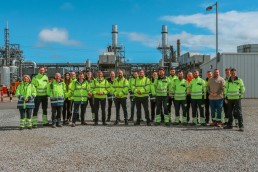Friday 26th April – Yesterday we welcomed Transport Secretary Mark Harper MP to our Teesside site on the day the Government announced measures to give UK aviation and the SAF industry the certainty to create green jobs and cut sector emissions. The Secretary of State toured Lighthouse Green Fuels facility along with Phil Forster, Managing Director at Teesside International Airport. Lighthouse Green Fuels facility is the largest and most advanced SAF project in Europe, and could reach Final Investment Decision in 2025 and be operational in 2028.
The project will take everyday household and commercial waste as well as other forms of non-recyclable waste feedstocks, such as waste biomass, which will be nationally sourced and which there is a plentiful supply of. The “drop-in” fuel will be ready to use in today’s aircrafts with no engine or refuelling infrastructure modifications needed. The facility will produce 175 million litres a year, the equivalent of fuelling 2,500 long-haul flights or 25,000 short-haul flights a year, whilst bringing investment to industrial areas.
Transport Secretary the Rt Hon Mark Harper MP said:
“Sustainable aviation fuel protects the future of UK aviation, the thousands of British jobs that depend on it, and the holidays and business travel flights that we all rely on. As part of our plan to grow the economy, the measures announced today will give UK SAF producers like Alfanar, the certainty they need to keep creating skilled British jobs while giving passengers the freedom to continue travelling by air in a way that’s fit for the future.”
Mishal Almutlaq, Alfanar Project’s Chief Investment Officer, said:
“Alfanar welcomes today’s announcement, an important step in the journey towards delivering a thriving SAF market in the UK. We were delighted to welcome Transport Secretary Mark Harper to our Teesside site, which is Europe’s largest and most advanced SAF project.
“The SAF mandate, coupled with a SAF revenue support mechanism, can make the UK a leader in green aviation fuel production. But to deliver the Government’s target of 5 SAF plants under construction by 2025, the SAF revenue support mechanism needs to be introduced at pace.
“Ninety years ago Teesside led the way in producing synthetic fuels which were then used in Spitfires during WW2. With continued Government support Teesside can once again become a crucible for aviation innovation as we tackle the challenge of climate change.”
